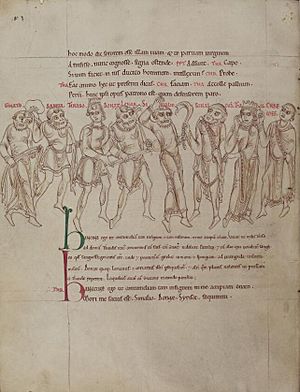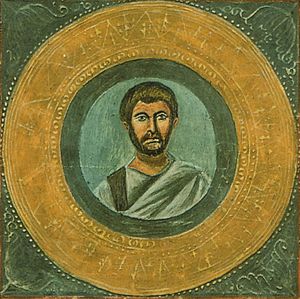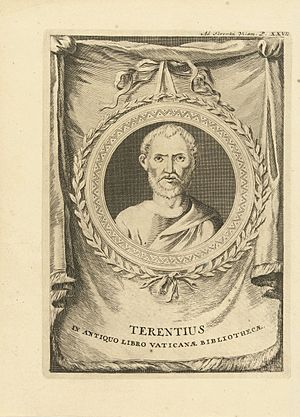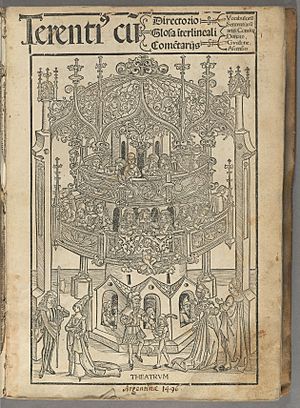Terence facts for kids
Quick facts for kids
Terence
|
|
|---|---|
| Born | Publius Terentius Afer c. 195/185 BC |
| Died | c. 159? BC |
| Occupation | Playwright |
| Nationality | Roman African |
| Period | Roman Republic |
Publius Terentius Afer (born around 195/185 BC – died around 159 BC), known as Terence in English, was an important Roman African playwright. He lived during the time of the Roman Republic. His funny plays, called comedies, were first shown to people around 170–160 BC.
Terence was brought to Rome as a slave by a Roman senator named Terentius Lucanus. This senator educated him. Impressed by Terence's talents, he later set him free. Terence died suddenly when he was about 25 years old. He likely died in Greece or on his way back to Rome. This might have been due to a shipwreck or a disease. He was probably traveling to find new ideas for his comedies.
His plays were very important for learning to speak and write Latin. People used them a lot during the Middle Ages and the Renaissance Period. Even famous writers like William Shakespeare sometimes copied ideas from his plays.
One of Terence's most famous sayings is: "Homo sum, humani nihil a me alienum puto." This means "I am human, and I think nothing human is alien to me." You can find this quote in his play Heauton Timorumenos.
Who Was Terence?
The exact year Terence was born is not fully known. Some experts say he was born in 185 BC, while others believe it was 195 BC. It is most likely that he was born sometime between these years.
Terence might have been born near Carthage in Africa. His last name, Afer, suggests he was from the area of the Berber people near Carthage. He was brought to Rome as a slave from there.
However, some people think that ancient writers just guessed he was from Africa because of his name. The name Afer could mean "North African". But sometimes Romans who were not from Africa also had this name. So, we are not completely sure if his name truly meant he was from Africa.
As the story goes, he was sold to a Roman senator named P. Terentius Lucanus. This senator taught him many things. He was so impressed by Terence's skills that he set him free. After being freed, Terence took the senator's family name, "Terentius." This is where his famous name comes from.
The Roman historian Suetonius described Terence as being "average height, thin, and dark-skinned." Terence also had a daughter who later married a Roman knight. He was part of a group of important Roman thinkers and writers called the Scipionic Circle.
When he was about 25, Terence traveled to Greece. He wanted to find new ideas and stories for his plays. He never returned from this trip. Most people believe he died during the journey. Some old writers say he died at sea from a shipwreck or a disease. Before he disappeared, he wrote six comedies that we still have today.
Terence's Plays
Like another Roman playwright named Plautus, Terence took ideas from Greek plays. These were from the later period of Attic comedy. However, Terence's writing style was different from Plautus'. Terence used simple, everyday Latin in his comedies. His plays were pleasant to listen to and very direct. They were less about funny visual jokes.
Some people say Terence used his plots better than Plautus. His language was purer, and his characters were more realistic. This might be why his plays were not as popular during his own time.
Terence's plays were very popular during the Middle Ages and the Renaissance. Many copies of his plays were made by hand. One expert believes there are about 650 handwritten copies of his work from after the year 800 AD. A medieval playwright named Hroswitha of Gandersheim even wrote her plays as a Christian alternative to Terence's pagan stories. Even Martin Luther, a famous reformer, often quoted Terence. He also suggested that children should read Terence's comedies in school.
Terence wrote six plays that we still have:
- Andria (The Girl from Andros) (166 BC)
- Hecyra (The Mother-in-Law) (165 BC)
- Heauton Timorumenos (The Self-Tormentor) (163 BC)
- Phormio (161 BC)
- Eunuchus (161 BC)
- Adelphoe (The Brothers) (160 BC)
The first printed version of Terence's plays came out in Strasbourg in 1470. The first known performance of one of his plays, Andria, after ancient times was in Florence in 1476. However, there is some proof that his plays were performed much earlier.
How Terence Influenced Others

Terence's plays were written in clear and entertaining language. Because of this, they were widely used in schools and religious houses during the Middle Ages and the Renaissance. People learning Latin often copied his texts very carefully. Priests and nuns would even act out his plays to learn Latin and Gregorian chants. Even though his plays were about ancient Roman (pagan) topics, the excellent quality of his language helped the church keep and save his writings. This preservation meant that Terence's work greatly influenced later Western plays.
Many famous writers were inspired by Terence. Giovanni Boccaccio copied all of Terence's comedies by hand. Two of the earliest English comedies, Ralph Roister Doister and Gammer Gurton's Needle, are thought to be based on Terence's plays. Writers like Montaigne, Shakespeare, and Molière also quoted and imitated him.
Terence's plays were a regular part of learning Latin during the neoclassical period. President of the United States John Adams once wrote to his son, John Quincy Adams, that "Terence is remarkable, for good morals, good taste, and good Latin." He added that Terence's language was simple and elegant, making him a great model to study. American playwright Thornton Wilder even based his novel The Woman of Andros on Terence's play Andria.
Terence's works were read in Roman schools for many years after he died. They were also studied in schools across Europe for centuries. This was because of the skilled way he used language in his plays. His works, along with those of Plautus, were so well-liked that even Shakespeare studied them in school.
Because of his name Afer, Terence has often been seen as connected to Africa. Many writers have called him the first poet of the African diaspora. This includes famous people like Juan Latino, Phillis Wheatley, Alexandre Dumas, Langston Hughes, and Maya Angelou. Some of his plays were even performed in Denver with Black actors.
People have debated for a long time whether Terence wrote his plays all by himself or if he had help. In one of his plays, Terence himself talked about getting help. He said it was an honor to have the support of people who were popular in Rome. This idea that he had help continued to be discussed by later writers like Cicero and Quintilian. Some believed that a famous Roman general, Scipio, helped write the plays, while others disagreed.
See also
 In Spanish: Terencio para niños
In Spanish: Terencio para niños
 | Jackie Robinson |
 | Jack Johnson |
 | Althea Gibson |
 | Arthur Ashe |
 | Muhammad Ali |




